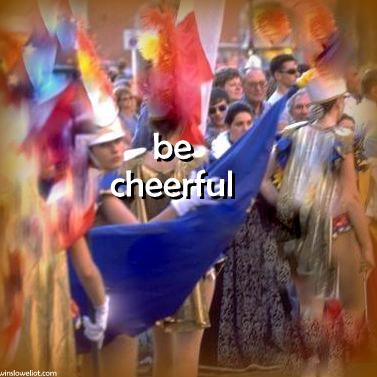 Way back when, the early Americans brought over from England the pleasant greeting of “What cheer?” This was taken on by the Algonquians, who incorporated it into their language, and apparently it later spread to other tribes around the continent. As a greeting, I like it better than “How are you?” or “How’re you doing?” Even the word “cheer” sounds cheery, friendly, and sympathetic too. “Cheer” originated from words that referred to our face, countenance, or expression. Did you know that if you look cheerful, you actually start feeling cheerful? You know how smiling ‘tricks’ your brain into making you think you’re feeling happy? The same with cheerfulness. So replace any stress about a pie you have to bake or an appointment you dread with conscious cheerfulness. Notice the rapt look on a child’s face when they’re watching a parade—emulate that. Or imagine the cheerful greeting you’d give a beloved old friend who’s shown up on your doorstep. People who live past 100 often relate their longevity to cheerfulness. Cheer can run through your veins like an elixir, imbuing you with warmth, community, and optimism in the same way a delicious slice of apple pie or a glass of mulled cider does. Cheering someone on motivates them to do what they long to do. A shout of encouragement—a cheer—can bolster anyone’s spirits, including our own. Being of good cheer can be the greatest comfort there is.
Way back when, the early Americans brought over from England the pleasant greeting of “What cheer?” This was taken on by the Algonquians, who incorporated it into their language, and apparently it later spread to other tribes around the continent. As a greeting, I like it better than “How are you?” or “How’re you doing?” Even the word “cheer” sounds cheery, friendly, and sympathetic too. “Cheer” originated from words that referred to our face, countenance, or expression. Did you know that if you look cheerful, you actually start feeling cheerful? You know how smiling ‘tricks’ your brain into making you think you’re feeling happy? The same with cheerfulness. So replace any stress about a pie you have to bake or an appointment you dread with conscious cheerfulness. Notice the rapt look on a child’s face when they’re watching a parade—emulate that. Or imagine the cheerful greeting you’d give a beloved old friend who’s shown up on your doorstep. People who live past 100 often relate their longevity to cheerfulness. Cheer can run through your veins like an elixir, imbuing you with warmth, community, and optimism in the same way a delicious slice of apple pie or a glass of mulled cider does. Cheering someone on motivates them to do what they long to do. A shout of encouragement—a cheer—can bolster anyone’s spirits, including our own. Being of good cheer can be the greatest comfort there is.
